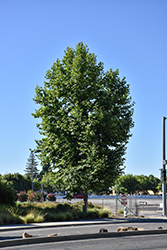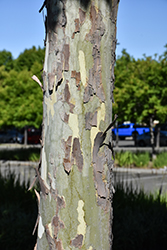It's all about ...
plants

Height: 70 feet
Spread: 50 feet
Sunlight:
![]()
![]()
Hardiness Zone: 8a
Other Names: Western Sycamore, Planetree
Description:
A fast growing California native tree, presenting interesting lobed and pointed leaves and beautiful mottled bark; a great shade tree for larger landscapes; tolerant of heat and wind, quite resistant to disease; salt and drought tolerant once established
Ornamental Features
California Sycamore has rich green foliage with grayish green undersides on a tree with an upright spreading habit of growth. The large serrated lobed leaves turn coppery-bronze in fall. The mottled silver bark is extremely showy and adds significant winter interest.
Landscape Attributes
California Sycamore is a multi-stemmed deciduous tree with an upright spreading habit of growth. Its relatively coarse texture can be used to stand it apart from other landscape plants with finer foliage.
This tree will require occasional maintenance and upkeep, and is best pruned in late winter once the threat of extreme cold has passed. It is a good choice for attracting birds and squirrels to your yard, but is not particularly attractive to deer who tend to leave it alone in favor of tastier treats. Gardeners should be aware of the following characteristic(s) that may warrant special consideration;
- Insects
California Sycamore is recommended for the following landscape applications;
- Accent
- Shade
Planting & Growing
California Sycamore will grow to be about 70 feet tall at maturity, with a spread of 50 feet. It has a high canopy of foliage that sits well above the ground, and should not be planted underneath power lines. As it matures, the lower branches of this tree can be strategically removed to create a high enough canopy to support unobstructed human traffic underneath. It grows at a fast rate, and under ideal conditions can be expected to live for 60 years or more.
This tree does best in full sun to partial shade. It is very adaptable to both dry and moist locations, and should do just fine under average home landscape conditions. It is considered to be drought-tolerant, and thus makes an ideal choice for xeriscaping or the moisture-conserving landscape. It is not particular as to soil type or pH, and is able to handle environmental salt. It is somewhat tolerant of urban pollution. This species is native to parts of North America.
This plant is not reliably hardy in our region, and certain restrictions may apply; contact the store for more information.

